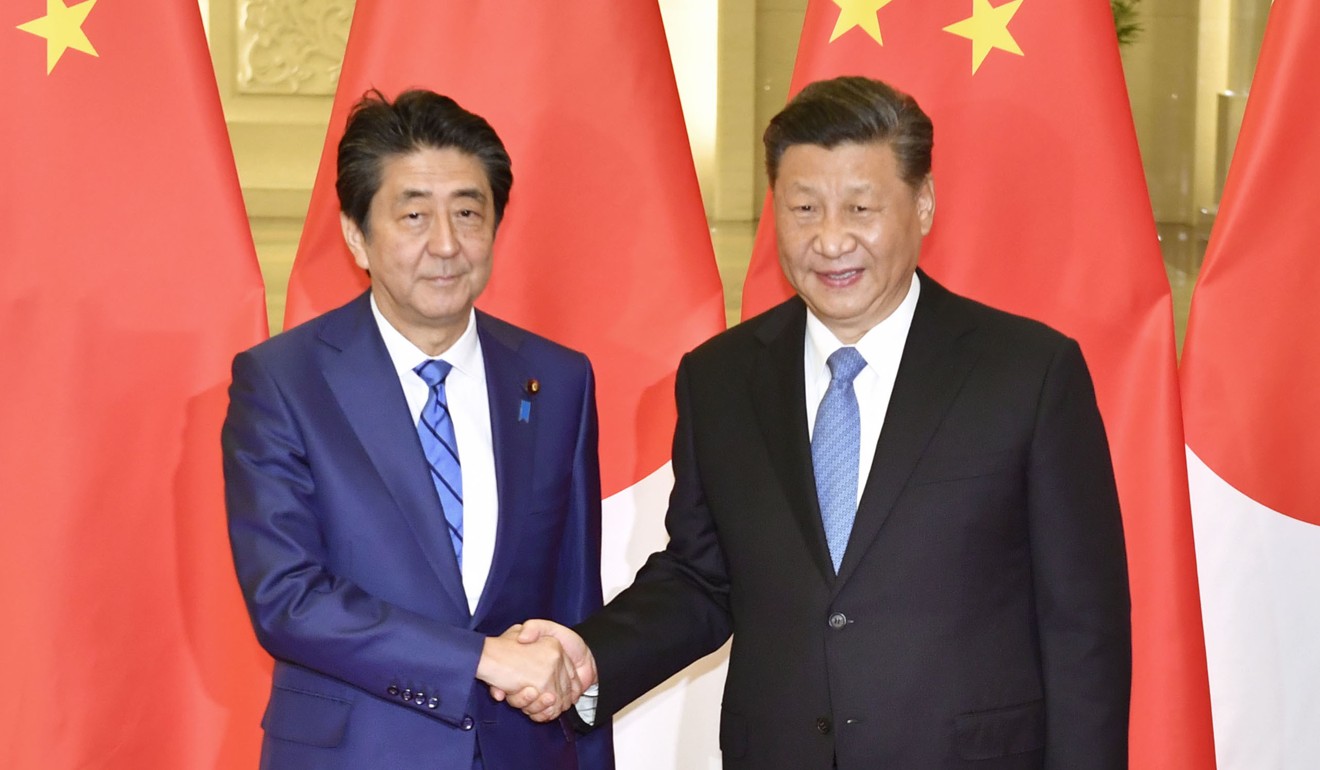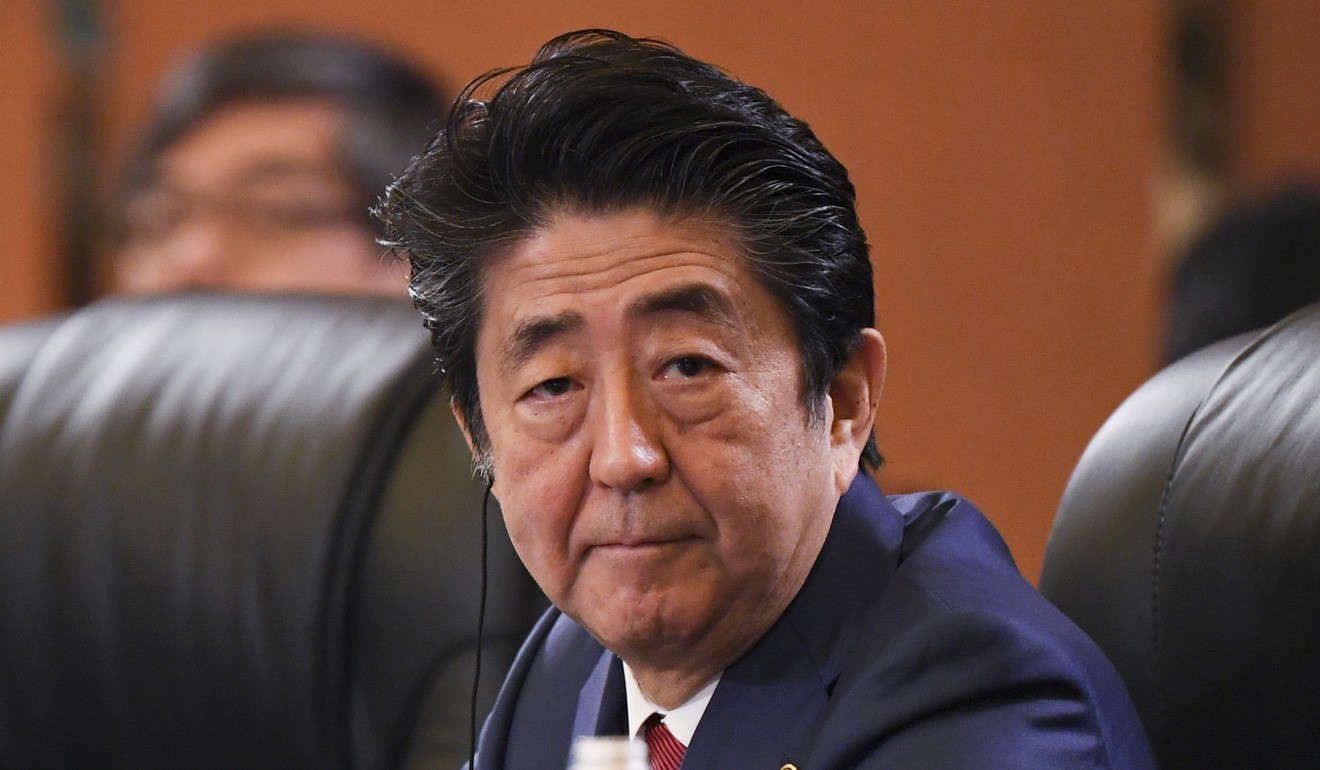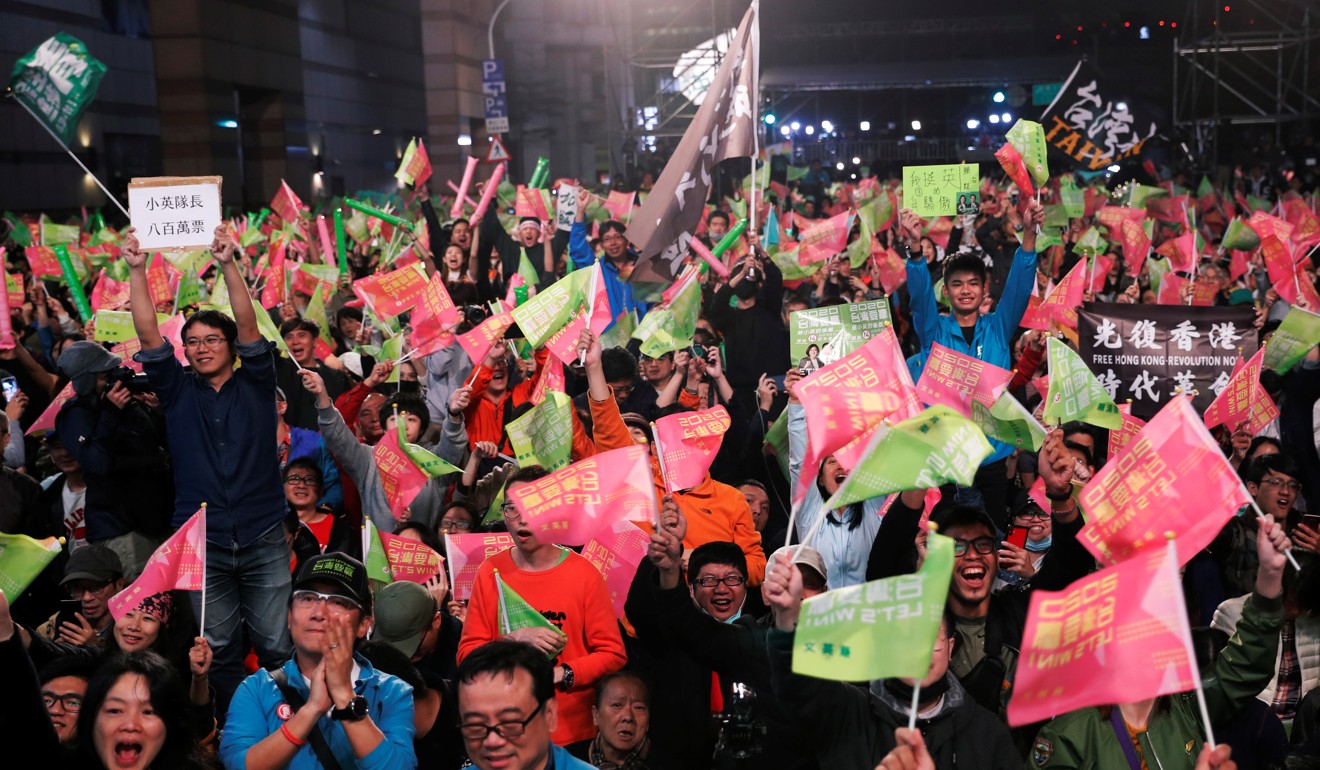As Japan welcomes Taiwan’s election result, Abe also wary of upsetting Beijing
- Japan has described Taiwan as a ‘special friend’ but PM Shinzo Abe is walking a tightrope as he strengthens ties with mainland China
- Taiwanese people, especially younger generations, have a soft spot for Japan, which has for decades been a welcoming and supportive neighbour

The Japanese government has congratulated Tsai Ing-wen on her landslide victory in Saturday’s presidential election and described Taiwan as a “precious friend” – although analysts believe Tokyo is unlikely to embrace Taipei too warmly for fear of antagonising Beijing.
In a statement issued after Tsai’s win, Foreign Minister Toshimitsu Motegi said Japan will work toward “further deepening cooperation and exchanges” between the Japanese and Taiwanese governments.
“Taiwan is an important partner and a precious friend of Japan. We share basic values and enjoy a close economic relationship and people-to-people exchanges,” Motegi said.
Japan’s envoy to Taipei was among the first foreign representatives to congratulate Tsai after her re-election. And before she won her first term as president in 2016, Tsai visited Japan and met Prime Minister Shinzo Abe.
“This is an interesting and unusual electoral win because it is being welcomed by both the political left and right in Japan,” said Koichi Nakano, a professor of politics at Tokyo’s Sophia University.
“The left welcomes proponents of democracy and progressive causes, such as denuclearisation, fair treatment of sexual minorities and so on,” he said. “Among conservatives – including some who could be categorised as extreme right-wingers – Tsai is popular because she has given the middle finger to Beijing.”
Yet while he will undoubtedly have welcomed Tsai’s electoral victory, Abe cannot be too fulsome in his praise, Nakano said.
“He does not have a lot of room for manoeuvre,” said Nakano. “He is walking something of a tightrope because of the uncertainty over the US-China trade war and the implications for Japan, as well as a number of other geopolitical factors.”
Abe has decided he “needs to get closer” to Chinese President Xi Jinping, remaining conspicuously quiet on events in Hong Kong, and he will probably adopt a similar approach to Taiwan out of fear of upsetting Beijing, Nakano pointed out.

Jeff Kingston, director of Asian studies at the Tokyo campus of Temple University, said the “Abe administration has made a number of symbolic gesture of support for Taiwan, stopping just short of provoking Beijing”. He concurs that the Japanese leader is standing on a tightrope.
“Abe wants Xi to go ahead with his planned visit in the spring and that the visit is a success, with Taiwan the most sensitive issue for the Chinese leadership.
“Japan won’t want to spoil that party and antagonise Beijing, but clearly Japan is very pleased by the outcome and by the people of Taiwan showing that it is arguably the most robust democracy in East Asia,” he said. “The election was a clear repudiation of Beijing’s heavy-handed tactics.”

China’s foreign ministry could similarly be accused of being blunt in the tweet it posted soon after the result of the election was clear, warning: “The one-China principle is a universal consensus. We hope countries concerned will abide by it, deal with Taiwan-related affairs cautiously, not engage in any official ties with Taiwan.”
Pointedly, it tagged Japan’s Foreign Ministry, the US State Department, the British Foreign Office and the EU Commission at the end of the message.
#TaiwanElection The one-China principle is a universal consensus. We hope countries concerned will abide by it, deal with Taiwan-related affairs cautiously, not engage in any official ties with Taiwan. @StateDept @foreignoffice @MofaJapan_en @EU_Commission
— Spokesperson发言人办公室 (@MFA_China) January 12, 2020
“Given the result of the election, Beijing is even more nervous about the mounting mood and Xi needs to use every means possible to ensure there is no deviation from his strategy,” said Nakano.
Abe will have divined those winds, however, and will continue Japan’s current course of action towards Taipei and make no efforts to get closer to Tsai’s administration, he added.
Nevertheless, Taiwanese people – particularly the younger generations – clearly have a soft spot for Japan, which has for decades been a welcoming and supportive neighbour, in contrast to an increasingly hectoring and threatening mainland China.
“Taiwanese are relatively fondly disposed to their former colonial master,” said Nakano. “There is even an element of nostalgia among older Taiwanese for the years of Japanese rule, which is in stark contrast to attitudes in Korea.

“I also think that the younger generations had no direct experience of colonial rule so the images they have of Japan are based on popular culture, such as anime, and tourism,” he said. “And now that China is becoming even more economically and politically dominant in the region, they find Japan something of an attractive alternative.”
Kingston concurs that the people of Taiwan see themselves as “distinctly different” to the Han people of mainland China, with Tokyo making a number of small but significant gestures over the years that have helped to strengthen bilateral ties, such as agreements on fishing rights, tourism and student and working visas.
These are a people that routinely express great adulation for Japan and nowhere else in East Asia do we see that affinity for the Japanese.
Japan has also benefited from the way in which history is taught in Taiwanese schools, with children from the mid-1980s learning that the island was well-run under Tokyo’s control – highlighting both how poorly previous governments had administered Taiwan and the unpleasantries that could be in store if Taiwan comes under direct control of Beijing.
“These are a people that routinely express great adulation for Japan and nowhere else in East Asia do we see that affinity for the Japanese,” Kingston said.